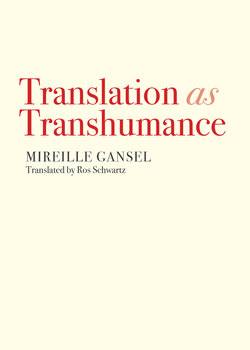Читать книгу Translation as Transhumance - Mireille Gansel - Страница 10
На сайте Литреса книга снята с продажи.
ОглавлениеLISTENING TO THE SILENCES
Whenever a letter arrived from Budapest, Father would become engrossed in reading it. The entire household held its breath and a reverent silence reigned. Sitting there in the big armchair, he was suddenly far away. Then, with ritual solemnity, he would announce: “Tonight, I am going to translate for you.” No one ever failed to be there or dared to be late. I recall listening to the silences while Father struggled to find the right word or sentence construction, sometimes stopping short and correcting himself. Mysterious gaps, tenuous bridges. The little girl loved hearing the words that spoke about her, and better still, hearing them uttered by this father who was so sparing with his compliments. One evening in particular stands out in my memory, when for the first time I experienced viscerally, without yet realizing its significance, what “translation” would come to mean for me. It all happened with the utmost simplicity, as is often the case when something is important. To my delight, the section of the letter my father was reading was about me. He initially translated a word used by his brother or one of his sisters as “beloved,” stumbled over the next word and repeated this—actually rather ordinary—adjective once, stumbled again, and then repeated it a second time. That triggered something in me. I dared to interrupt him. I asked: “But in Hungarian, is it the same word?” He replied evasively: “It means the same thing!” Undeterred, I pressed him: “But what are the words in Hungarian?” Then, one by one, he enumerated, almost with embarrassment, or at least with a certain reticence, as though there were something immodest about it, the four magic words which I have never forgotten: drágám, kedvesem, aranyoskám, édesem. Fascinated, I relentlessly pestered him, begging him to translate for me what each word meant. Drágám, my darling; kedvesem, my beloved; and two other words whose sensual literalness I would never forget: aranyoskám, my little golden girl; édesem, my sweet. That evening I discovered that words, like trees, had roots whose magic my father had revealed to me: arany, gold; édes, sweet; each of these terms enriched by a lovingly enveloping possessive. All of a sudden, the blueprint of my native French glowed from within.
Those four words opened up another world, another language that would one day be born within my own language—and the conviction that no word that speaks of what is human is untranslatable.
